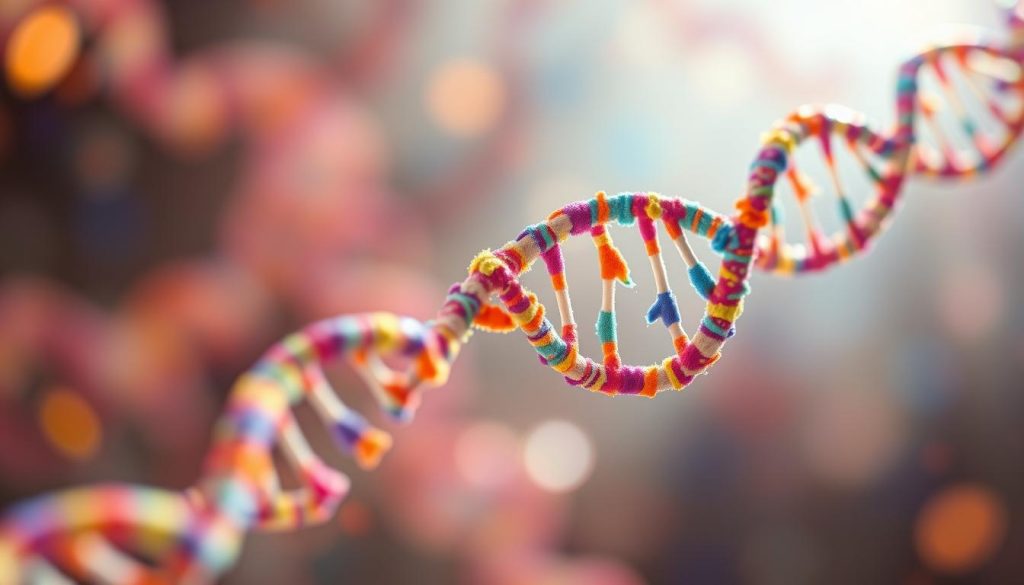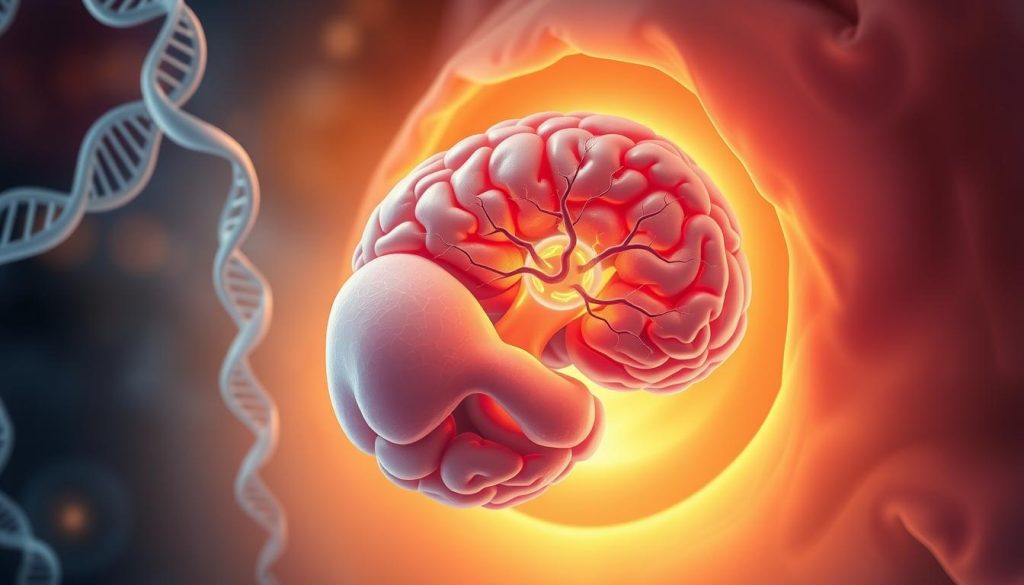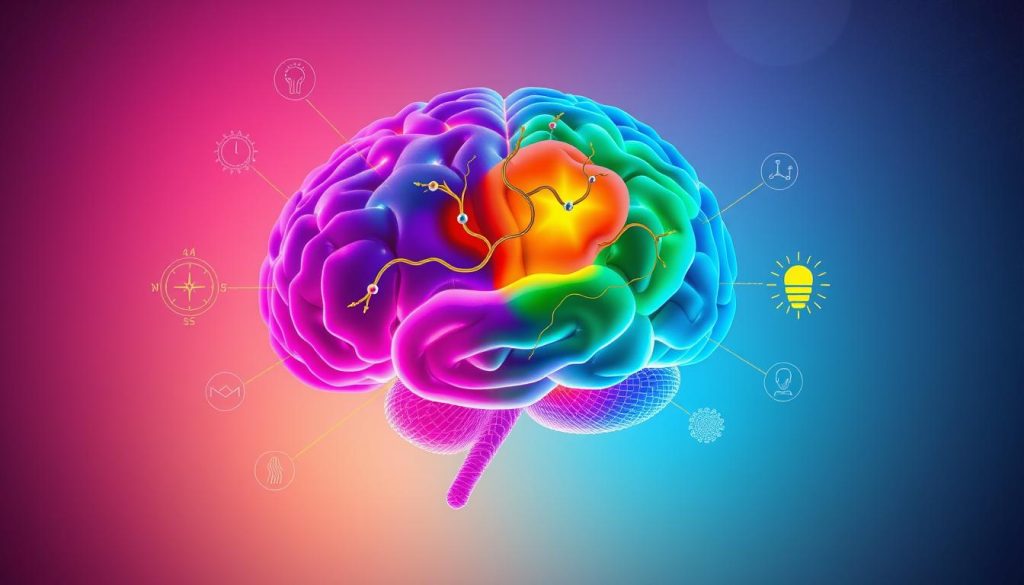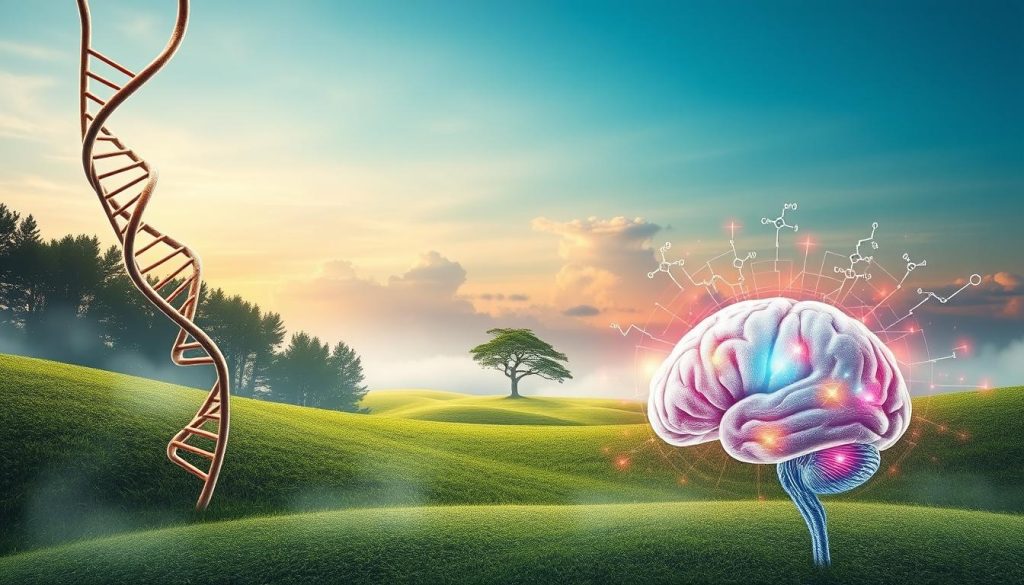Autism spectrum disorder (ASD) affects millions globally. To understand it, we must look at its main causes. These are genetic, environmental, and developmental factors.
The causes of autism are complex. Scientists have found many risk factors. These include genes and prenatal experiences.
Studying these areas helps us understand ASD better. This knowledge aids families and healthcare providers. It also drives research for better treatments and support.
What Are the 3 Main Causes of Autism: A Comprehensive Overview
Autism spectrum disorder (ASD) is a complex condition with many factors at play. Research shows three main causes: genetic, environmental, and brain development issues. Knowing these is key for early detection and help.
Genetic factors are a big part of ASD. Scientists have found many genes linked to autism risk. These genes can be passed down or happen by chance early in life.
Environmental factors also matter a lot. Things like infections in the mother, certain chemicals, and birth complications can raise a child’s risk of ASD. These factors often work together with genetics, making it a complex issue.
Autism and brain development are closely tied. Studies have found differences in brain structure and function in people with ASD. These differences can affect how brain areas talk to each other, leading to autism’s hallmark behaviors.
- Genetic variations
- Environmental exposures
- Atypical brain development patterns
By looking into these three main causes, researchers hope to improve diagnosis and treatment for autism. This detailed approach brings hope for better understanding and support for those with ASD.
Genetic Factors as a Primary Cause of Autism Spectrum Disorder
Genetics are key in autism spectrum disorder (ASD). Research shows genetics account for 60 to 90% of the risk. Knowing these genetic factors helps us understand ASD better.

Inherited Gene Mutations and Their Role in Autism
Some gene mutations from parents can raise ASD risk. These mutations impact brain growth and how it works. Scientists have found several autism-linked genes, but how they work is being studied.
Chromosomal Abnormalities Associated with ASD
People with autism might have chromosomal issues. This includes extra or missing genes. Such problems can mess with brain development, causing ASD symptoms.
Family History and Autism Risk Assessment
A family history of ASD is a big risk factor. If a sibling has autism, the risk goes up. This shows why early screening is important in families with ASD history.
Genetic tests can spot specific autism causes. This info helps tailor support and care. As research advances, we learn more about autism’s genetic roots, leading to better help and support.
Environmental Risk Factors During Pregnancy
Pregnancy is a key time for a baby’s growth. Environmental factors can greatly affect a child’s health. Studies have found links between environmental causes of autism and prenatal care.
High stress in pregnancy can raise autism risk. Stress hormones can harm a baby’s brain development. It’s vital for expectant mothers to find ways to reduce stress.
Some medications taken during pregnancy might also increase autism risk. Antidepressants, like SSRIs, could affect a baby’s brain. Women should talk to their doctors about any medications they’re taking.
Environmental toxins are another concern. Pesticides, air pollution, and heavy metals can harm a developing baby. Pregnant women should try to avoid these toxins and reduce their exposure.
| Environmental Factor | Potential Impact | Preventive Measures |
|---|---|---|
| Maternal Stress | Altered neural connections | Stress-reduction techniques, prenatal yoga |
| Certain Medications | Changes in fetal brain development | Consult healthcare provider, explore alternative treatments |
| Environmental Toxins | Disruption of fetal development | Avoid pesticides, limit exposure to air pollution |
Knowing about these risks helps expectant mothers make better choices. By tackling these prenatal causes of autism, we can help ensure healthier babies for the future.
Prenatal Development and Autism Connection
Research has shown a strong link between prenatal development and autism. Factors during pregnancy can increase the risk of autism spectrum disorder (ASD). Knowing these causes is important for early help and prevention.
Critical Periods of Brain Development
The fetal brain changes a lot during pregnancy. These changes are very sensitive to the environment. Disruptions can change brain pathways, possibly leading to autism. Scientists are studying how autism and brain development are connected during these times.

Maternal Health Conditions Impact
A mother’s health in pregnancy affects the baby’s brain. Conditions like diabetes, high blood pressure, and infections can harm the brain. These can raise the risk of autism by changing how the brain develops. Good prenatal care is key to reduce these risks.
Prenatal Vitamin Deficiencies
Nutrients are vital for brain growth. Not getting enough vitamins and minerals can lead to brain problems. Folic acid, iron, and vitamin D deficiencies are linked to higher autism risk. Eating right during pregnancy helps the brain develop well and lowers autism risk.
The Role of Immune System Dysfunction in Autism
Recent studies have shown a strong link between autism and immune system problems. This connection is key to understanding why autism happens. Scientists believe that issues with the immune system may play a part in autism spectrum disorder (ASD).
Research indicates that when a mother’s immune system is active during pregnancy, it can affect the baby’s brain. This can happen due to infections or other immune issues. It may cause changes in the baby’s brain that raise the risk of ASD.
People with autism often face ongoing immune challenges. These can include:
- Increased inflammation in the brain and body
- Altered immune cell function
- Abnormal levels of immune proteins
These differences in the immune system may impact brain development and function in those with ASD. Learning more about this connection could help find new ways to prevent and treat autism.
| Immune System Factor | Potential Impact on Autism |
|---|---|
| Maternal immune activation | Altered fetal brain development |
| Chronic inflammation | Ongoing brain and body stress |
| Immune cell dysfunction | Impaired neurological processes |
As scientists continue to study this area, they hope to find new ways to tackle autism and immune system issues. This could lead to better lives for individuals with ASD and their families.
Advanced Parental Age and Autism Risk
The age of parents when they conceive a child is key in autism risk. Studies have shown that both the mother’s and father’s ages can affect the chance of autism in their kids.

Paternal Age Considerations
Men over 40 are more likely to pass on genetic mutations to their kids. These mutations are linked to autism. As men get older, their sperm gets more DNA changes, raising the risk of autism in their children.
Maternal Age Impact
Women over 35 also face higher autism risks for their kids. This could be due to changes in egg quality and hormones during pregnancy. Older mothers are also more likely to have pregnancy problems, which can harm fetal brain development.
Combined Age Effects
When both parents are older, the risk of autism increases. This shows how genetics and environment work together in autism. Knowing these risks helps families plan better for their future.
| Parental Age | Relative Autism Risk | Key Factors |
|---|---|---|
| Father 40+, Mother 35+ | Highest | Genetic mutations, pregnancy complications |
| Father 40+, Mother <35 | Elevated | Paternal genetic mutations |
| Father <40, Mother 35+ | Moderate | Maternal health factors |
| Both parents <35 | Baseline | Standard population risk |
Environmental Toxins and Their Impact on Neural Development
Recently, scientists have looked into how environmental toxins might affect brain growth. They are studying how our surroundings could be linked to autism risk.
Some chemicals in our environment might harm brain development. These include pesticides, air pollutants, and heavy metals. Women who are pregnant and exposed to these might have a higher risk of having a child with autism.
Research shows that some toxins can pass through the placenta. This means they can reach the growing fetus. Once there, they might mess with how brain cells connect. This could cause the behaviors seen in autism spectrum disorders.
| Environmental Toxin | Potential Impact on Neural Development |
|---|---|
| Lead | Impairs brain cell communication |
| Mercury | Affects neurotransmitter function |
| Pesticides | Disrupts hormone balance critical for brain growth |
| Air Pollution | Causes inflammation in developing brain tissue |
It’s important to reduce autism risk by avoiding toxins. Pregnant women should try to avoid known toxins. This could mean choosing organic foods and using natural cleaning products. By doing this, we might lower the risk of environmental impacts on autism development.
Maternal Infections During Pregnancy and Autism Risk
Researchers have found a link between maternal infections during pregnancy and autism risk. This shows how a mother’s health can affect her child’s brain development.
Viral Infections
Viral infections during pregnancy might lead to autism. Not all viruses are harmful, but some can affect the baby’s brain. A study on maternal infections found some viruses could raise autism risk.
Bacterial Infections
Bacterial infections are also linked to autism. The same study showed mothers with bacterial infections during hospital stays had a higher autism risk. This shows why treating infections early is key.
Immune Response Effects
The mother’s immune response to infections is important for autism. Autism and immune issues are connected, as the mother’s immune system can influence the baby’s brain. This shows how prenatal immune issues can impact brain development.
Learning about these connections is vital for preventing autism. As research continues, we find new ways to help during pregnancy.
Oxidative Stress and Neurological Impact
Oxidative stress is key in autism and brain growth. It happens when harmful molecules, called free radicals, outdo the body’s defenses. In autism, this imbalance harms brain function.
Studies connect autism and oxidative stress to brain changes. Kids with autism often have more oxidative stress markers. This can harm cells, proteins, and DNA, messing with brain growth.
The brain is very sensitive to oxidative damage. It’s because of its high energy needs and fat content. In autism, this sensitivity might lead to:
- Impaired neurotransmitter function
- Inflammation in brain tissues
- Disrupted synaptic connections
- Altered brain cell metabolism
Scientists are looking into antioxidant treatments for autism. These aim to lower oxidative stress and help brain growth. But, more research is needed to grasp the link between oxidative stress and autism.
| Oxidative Stress Marker | Levels in Autism | Potential Impact on Brain |
|---|---|---|
| Lipid peroxidation | Increased | Damages cell membranes |
| Glutathione | Decreased | Reduces antioxidant defense |
| Nitric oxide | Elevated | Causes neuroinflammation |
Early Brain Development Patterns in Autism
Autism and brain development are closely linked, with unique patterns emerging in early childhood. Understanding these differences sheds light on autism etiology and helps explain the diverse traits associated with autism spectrum disorder (ASD).
Neuronal Connection Formation
In autism, the brain forms connections differently. Some areas show increased connectivity, while others have reduced connections. This imbalance affects how information is processed and can lead to sensory sensitivities or social challenges common in ASD.
Brain Structure Differences
Studies reveal structural variations in autistic brains. The amygdala, responsible for emotion processing, often shows atypical growth patterns. The cerebellum, involved in motor control and cognitive functions, may also develop differently in individuals with autism.

Developmental Milestones
Children with autism might reach developmental milestones at different rates. Language acquisition, social skills, and motor development can vary widely. Some kids may excel in certain areas while facing challenges in others, reflecting the complex nature of autism etiology.
| Developmental Area | Typical Development | Autistic Development |
|---|---|---|
| Social Smile | 2-3 months | May be delayed or less frequent |
| First Words | 12-18 months | Often delayed, some may not speak |
| Pretend Play | 18-24 months | May be limited or absent |
Metabolic Factors Contributing to Autism
Recent studies have shown that metabolic factors play a role in autism. Scientists are looking into how certain metabolic processes affect brain development in people with autism spectrum disorder (ASD).
Mitochondrial dysfunction is a key area of study. Mitochondria are the energy-producing centers of cells. Some think that problems with mitochondria could be linked to autism, affecting brain cell growth and communication.
Metabolic disorders are also being researched. These conditions can mess up how the body handles certain substances, which might impact brain development. For instance, untreated phenylketonuria (PKU) can increase the risk of autism.
The connection between the gut and brain in autism is also being explored. The gut microbiome, full of trillions of microorganisms, might influence brain function. Some studies suggest that differences in gut bacteria could be linked to ASD symptoms.
| Metabolic Factor | Potential Impact on Autism |
|---|---|
| Mitochondrial Dysfunction | May affect brain cell growth and communication |
| Metabolic Disorders | Can disrupt brain development if untreated |
| Gut Microbiome Imbalance | Possibly associated with ASD symptoms |
These findings are exciting, but more research is needed. As we learn more, we might find new ways to detect and treat autism early.
The Impact of Birth Complications
Birth complications are a big factor in autism risk. The birth process can sometimes go wrong, affecting a child’s brain development. It’s important for parents and doctors to understand these risks.
Oxygen Deprivation Effects
Babies who don’t get enough oxygen at birth may face brain damage. This lack of oxygen, or hypoxia, can harm the brain’s sensitive areas. Research shows a link between hypoxia and a higher chance of autism.

Premature Birth Risks
Babies born early face big challenges. Their brains are not fully developed and can be easily hurt. Premature babies are more likely to develop autism, showing how early birth can be a risk factor.
Birth Trauma Considerations
Physical harm during delivery can lead to brain problems. Issues like long labor, forceps, or emergency C-sections may raise autism risks. While not all birth traumas cause autism, they need close watch on a child’s growth.
| Birth Complication | Potential Impact on Autism Risk | Recommended Follow-up |
|---|---|---|
| Oxygen Deprivation | Moderate to High | Regular neurological assessments |
| Premature Birth | Varies with gestational age | Developmental screenings |
| Birth Trauma | Low to Moderate | Close monitoring of milestones |
Epigenetic Influences on Autism Development
Epigenetics is key to understanding autism. It looks at how the environment can change gene expression without altering DNA. Recent studies have shown how epigenetics plays a role in autism spectrum disorder (ASD).
Many environmental factors can cause epigenetic changes. These include maternal stress, diet, and toxins. These changes can affect gene expression, leading to autism traits. Studies have found that certain epigenetic markers are more common in people with ASD.
DNA methylation is a focus of research. It can turn genes on or off. Scientists have found differences in methylation patterns between those with autism and those without. These differences may impact brain development and function, leading to ASD symptoms.
Histone modification is another important area. It changes how tightly DNA is packed. This can make genes more or less accessible, affecting neurodevelopment. Researchers are looking into how these modifications might increase autism risk.
| Epigenetic Mechanism | Potential Impact on Autism |
|---|---|
| DNA Methylation | Alters gene expression in brain development |
| Histone Modification | Affects accessibility of genes related to neurodevelopment |
| microRNA Regulation | Influences protein production in neural cells |
Understanding epigenetics offers new insights into autism. It connects genetic and environmental factors, giving a clearer picture of ASD development. This knowledge could lead to better diagnostic tools and treatments in the future.
Modern Research Advances in Autism Causation
Recent studies have uncovered new insights into autism’s causes. Scientists now see that autism’s roots are more complex than before. The mix of genes, environment, and brain growth makes each person’s autism unique.
Genetic research has made significant progress. Over 100 genes have been linked to autism risk. But it’s not just about having these genes. How they are turned on or off is also key. This area, called epigenetics, is changing our understanding of autism causes.
Environmental factors are getting more focus in autism research. Air pollution and certain chemicals might play a role. Scientists are also studying how a mom’s health during pregnancy affects autism risk. These discoveries are helping shape new ways to prevent and treat autism.
Brain imaging studies offer fresh insights into autism’s causes. They show how the brains of people with autism grow and connect differently. This knowledge could lead to earlier diagnosis and better treatments. As we learn more about autism’s causes, we get closer to helping those affected by this complex condition.
FAQ
Q: What are the three main causes of autism?
A: Autism’s main causes are genetics, environment, and brain development. These factors often work together. This makes autism a complex condition.
Q: How do genetic factors contribute to autism?
A: Genetics are key in autism. Inherited mutations and family history play a big role. Many genes linked to autism have been found.
Q: What environmental factors during pregnancy can increase the risk of autism?
A: Pregnancy factors like stress and toxins can raise autism risk. Medications and infections also play a part. They can affect the brain’s development.
Q: How does prenatal brain development relate to autism?
A: Brain development before birth is vital in autism. Disruptions during this time can lead to ASD. Maternal health and vitamin deficiencies are also important.
Q: Is there a connection between the immune system and autism?
A: Yes, there’s a link between the immune system and autism. Maternal immune activation and ongoing challenges can contribute to ASD.
Q: Does parental age affect autism risk?
A: Older parents increase autism risk. Both parents’ age can lead to genetic changes. These changes may raise the chance of ASD in children.
Q: How do environmental toxins impact autism development?
A: Toxins can harm brain development and raise autism risk. Pollutants and chemicals have been linked to ASD. They can affect brain function.
Q: Can maternal infections during pregnancy increase autism risk?
A: Yes, infections during pregnancy can increase autism risk. Both viral and bacterial infections can impact brain development. This can lead to ASD.
Q: What is the role of oxidative stress in autism?
A: Oxidative stress may affect autism development. It can impact brain function and development. Research is ongoing to understand this link.
Q: Are there specific brain development patterns associated with autism?
A: Yes, autism is linked to unique brain development patterns. These include differences in connections and structure. They may contribute to ASD’s characteristics.
Q: How do metabolic factors contribute to autism?
A: Metabolic factors, like mitochondrial dysfunction, can contribute to autism. They can impact brain function and development in ASD individuals.
Q: Can birth complications increase the risk of autism?
A: Yes, birth complications like oxygen deprivation can increase autism risk. They can affect early brain development.
Q: What is the role of epigenetics in autism development?
A: Epigenetics plays a role in autism by influencing gene expression. Environmental factors can trigger epigenetic changes. These may contribute to ASD.
Q: What are some recent advances in autism causation research?
A: Recent research has shed new light on autism’s causes. It shows how genetics, environment, and development interact. New theories and technologies are helping us understand ASD better.


















